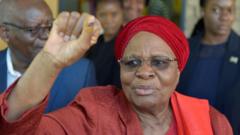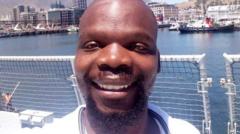As votes continue to be tallied from last week's contest, Namibia stands on the brink of selecting its first woman president. Netumbo Nandi-Ndaitwah, the incumbent vice-president, is emerging as the frontrunner, with her party, the South West Africa People's Organisation (Swapo), asserting a significant lead. However, rival candidates raise concerns regarding the electoral process.
Namibia Poised to Elect Its First Female President Amid Election Controversy

Namibia Poised to Elect Its First Female President Amid Election Controversy
Netumbo Nandi-Ndaitwah, currently vice-president, leads the elections with over 58% of the vote, defying allegations of malpractice.
With more than 90% of the votes from last week’s presidential election tallied, Nandi-Ndaitwah leads with over 58% of the votes, while her closest competitor, Panduleni Itula, has garnered approximately 25%. Despite this substantial lead, Itula and his party, the Independent Patriots for Change (IPC), have announced they will not accept the election results due to alleged electoral irregularities. They contest that logistical issues and extended voting times have compromised the fairness of the election.
Swapo, which has held political power since Namibia's independence in 1990, is set to face one of its toughest challenges yet. Nandi-Ndaitwah, a seasoned politician with a 25-year public service history, aims to solidify her position as the nation’s first female leader. If successful, she would join an exclusive group of female heads of state in Africa, alongside Tanzania’s Samia Suluhu Hassan.
To avoid a second-round runoff, a candidate must secure over 50% of the votes, a target that Nandi-Ndaitwah appears poised to meet. However, the election’s integrity has been called into question, prompting the IPC to consider legal action. They are urging residents who face voting issues due to electoral mismanagement to notify local authorities.
Swapo's long-standing tenure in Namibia reflects the history of liberation movements in Southern Africa. Recent electoral outcomes in the region have shown declining support for such parties, raising questions about Swapo's future. With rising discontent among the electorate, the coming days are crucial as Nandi-Ndaitwah’s victory—if confirmed—could signify a new direction for Namibia's political landscape.
Swapo, which has held political power since Namibia's independence in 1990, is set to face one of its toughest challenges yet. Nandi-Ndaitwah, a seasoned politician with a 25-year public service history, aims to solidify her position as the nation’s first female leader. If successful, she would join an exclusive group of female heads of state in Africa, alongside Tanzania’s Samia Suluhu Hassan.
To avoid a second-round runoff, a candidate must secure over 50% of the votes, a target that Nandi-Ndaitwah appears poised to meet. However, the election’s integrity has been called into question, prompting the IPC to consider legal action. They are urging residents who face voting issues due to electoral mismanagement to notify local authorities.
Swapo's long-standing tenure in Namibia reflects the history of liberation movements in Southern Africa. Recent electoral outcomes in the region have shown declining support for such parties, raising questions about Swapo's future. With rising discontent among the electorate, the coming days are crucial as Nandi-Ndaitwah’s victory—if confirmed—could signify a new direction for Namibia's political landscape.






















